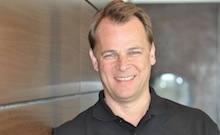
Lars Reichelt, CEO of mobile operator Cell C, has criticised the Independent Communications Authority of SA (Icasa) for not consulting more with industry players before publishing draft regulations on mobile termination rates.
Icasa wants the rates, which the mobile operators charge one another and other operators to carry calls onto their networks, reduced from 89c/minute in peak calling times now to 65c/minute all-day from July 2010. It has proposed reducing the rate to 40c/minute all-day by July 2012.
The rates should result in a reduction in retail tariffs, though the likely extent of these reductions is difficult to predict.
Reichelt, pictured above, says Cell C is “not happy” that Icasa has not shared the methodology it used in determining the proposed rates. “What is the international benchmark and what are the cost assumptions?” he says. “We are not happy there was zero engagement beforehand with the industry.”
Like Vodacom and MTN, Cell C is a net beneficiary of the existing interconnection rates regime and Reichelt admits that a voluntarily reduction in the rates in March is already having a negative effect on the operator’s financial performance. “We are happy to see interconnect go lower, but not necessarily to the extent [proposed by Icasa],” he says.
Reichelt says he also “finds is strange” that Icasa determined Cell C to have significant market power for the purpose of regulation. Operators deemed to have this power will be excluded from enjoying certain regulatory benefits. Cell C is SA’s smallest mobile operator with about 10% market share.
“[The finding of significant market power] is effective only for MTN, Vodacom and us,” Reichelt says. “There’s something wrong with that. You have to look at the market as a whole, and not just say you have your own network and you are therefore a monopolist.”
Reichelt says he also concerned that Icasa is not providing the sort of predictability investors need to make decisions. Cell C is investing more than R5bn in 2010 in expanding its network, including building 3G infrastructure.
“There needs to be a level of predictability that we fear is not there,” he says. — Duncan McLeod, TechCentral
- Subscribe to our free daily newsletter
- Follow us on Twitter or on Facebook




